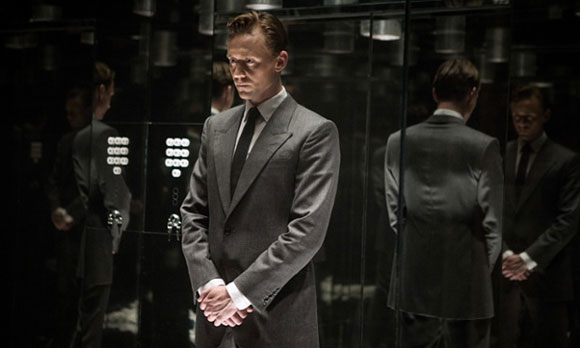Visually arresting, technically challenging and topically on point, Ben Wheatley’s High-Rise is a unique piece of cinema. Martin Carr takes a closer look at one of British cinema’s best films of 2015.
 Welcome to the High-Rise. An absurdist fantasy mainlining Kubrick, Fincher and the smallest dash of Peter Greenaway, into a concoction of such cinematic potency that repeat viewing should be mandatory. Ben Wheatley has created something alongside screenwriter Amy Jump, which defies narrative convention, structural constraints and the necessity for closure. To attempt a dissection of High-Rise is as foolish as climbing Everest without breathing apparatus. There is such a mix of techniques, pitch black humour, social satire and political irony at play that some may find it too much.
Welcome to the High-Rise. An absurdist fantasy mainlining Kubrick, Fincher and the smallest dash of Peter Greenaway, into a concoction of such cinematic potency that repeat viewing should be mandatory. Ben Wheatley has created something alongside screenwriter Amy Jump, which defies narrative convention, structural constraints and the necessity for closure. To attempt a dissection of High-Rise is as foolish as climbing Everest without breathing apparatus. There is such a mix of techniques, pitch black humour, social satire and political irony at play that some may find it too much.
Adapted from J G Ballard’s novel of the same name, both director and writer have lifted generously from and adapted elements of their own into the mix. Tom Hiddleston commits fully to the premise of tower block living, where class division, social status and cultural expectations are all built into your tenancy agreement. Every time I watch Hiddleston it feels like he has been perfectly cast, whether in Marvel movies, fair to middling bio pics, or the occasional BBC drama, there is never a moment of doubt.
With Robert Laing he demonstrates his mastery of emotional detachment, whether engaged in coitus, attending parties or debating the need for social change opposite an excellent Jeremy Irons. There is so much of relevance going on around him that you almost miss how easy he makes things look. While Sienna Miller’s Charlotte is the epitome of a social climber and luke Evan’s Wilder our literal and metaphorical loose cannon, it is Laing who acts as a physical conduit to all. Useful enough to be useful but not arrogant enough to create waves, he is the social chameleon, survivor and least likely to suffer when this microcosm finally implodes. While Iron’s architect admits no culpability, extracts maximum advantage, yet possesses no desire to fix his mistake.

High-Rise is a unique piece of cinema – visually arresting, technically challenging and topically on point. Out of the trap and following his own agenda, Wheatley and Jump have given us a sledgehammer subtle deconstruction of social preoccupations all Seventies excess and psychedelic sling backs. Ballard’s barbed sentiments concerning the state of society never seeming more relevant than they do now. Having been voted out of the EU by a misinformed electorate this United Kingdom stands on the cusp of an economical abyss. Less than a week ago the second female Prime Minister in British history took office without public opinion or polling booth to back her up. While media information ran rift, governments resorted to name calling and Nintendo released a game which encouraged the populous to walk into the road after Pokemon. It would seem the devolution of our economy, weakened currency and lack of cohesive democratic rule are nothing compared to finding a Pikachu.
What High-Rise represents then is this generation’s Fight Club. A millennial reimaging of the Fincher classic, equal parts wake-up call and cautionary tale. A more lucid, lurid and lascivious version of a malfunctioning social strata is hard to conjure. Essential viewing for anyone old enough to vote this is less movie experience more social document. You may not agree but that was never the intention. This reviewer craves not acceptance but the promotion of debate to form individual opinions.



